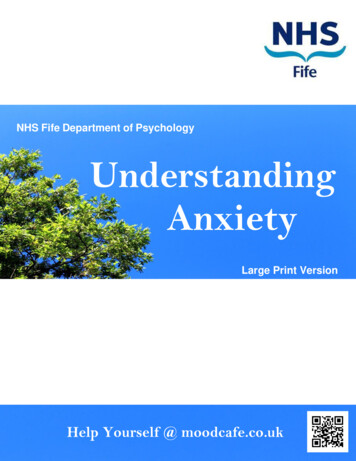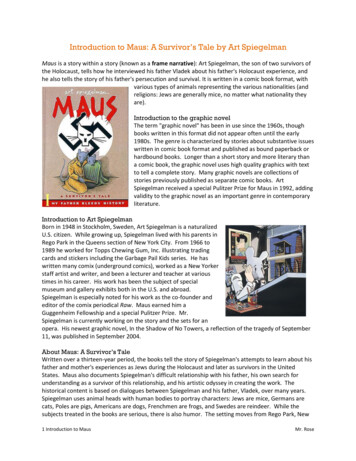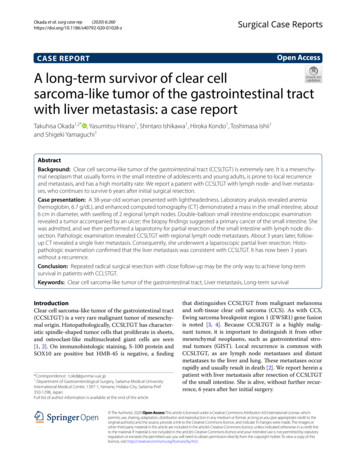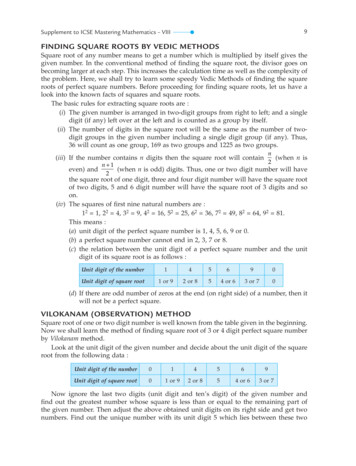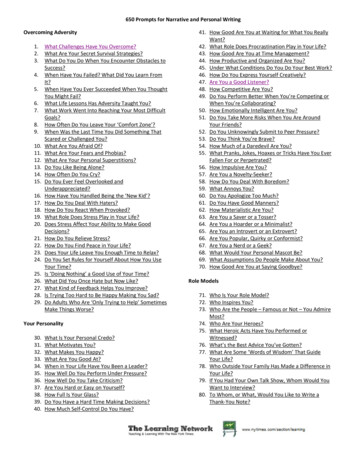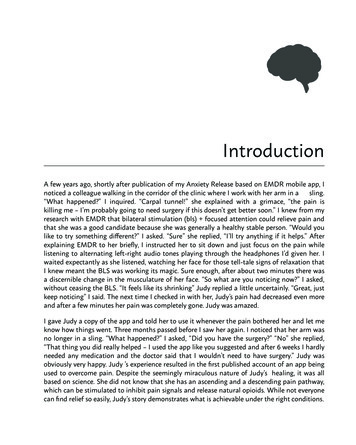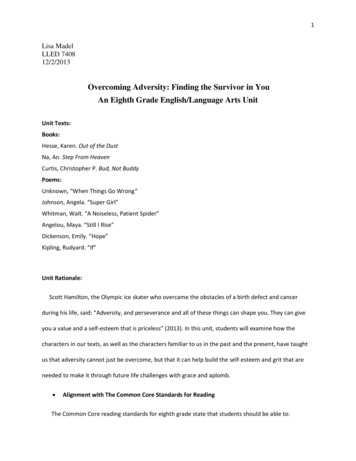
Transcription
1Lisa MadelLLED 740812/2/2013Overcoming Adversity: Finding the Survivor in YouAn Eighth Grade English/Language Arts UnitUnit Texts:Books:Hesse, Karen. Out of the DustNa, An. Step From HeavenCurtis, Christopher P. Bud, Not BuddyPoems:Unknown, “When Things Go Wrong”Johnson, Angela. “Super Girl”Whitman, Walt. “A Noiseless, Patient Spider”Angelou, Maya. “Still I Rise”Dickenson, Emily. “Hope”Kipling, Rudyard. “If”Unit Rationale:Scott Hamilton, the Olympic ice skater who overcame the obstacles of a birth defect and cancerduring his life, said: “Adversity, and perseverance and all of these things can shape you. They can giveyou a value and a self-esteem that is priceless” (2013). In this unit, students will examine how thecharacters in our texts, as well as the characters familiar to us in the past and the present, have taughtus that adversity cannot just be overcome, but that it can help build the self-esteem and grit that areneeded to make it through future life challenges with grace and aplomb. Alignment with The Common Core Standards for ReadingThe Common Core reading standards for eighth grade state that students should be able to:
2Determine a theme or central idea of a text and analyze its development over the course of thetext, including its relationship to the characters, setting, and plot, provide an objective summaryof the text [and] [c]ompare and contrast the structure of two or more texts and analyze howthe differing structure of each text contributes to its meaning and style (Common CoreStandards Initiative, 2012).In this unit, students will discuss the central theme of overcoming adversity in the text Out of theDust, by Karen Hesse, and will compose a multi-genre project comparing and contrasting obstacles intheir own lives to those of the characters in the book and in additional texts with the same theme. TheCore also stresses in the eighth grade Range of Reading section that students should be able to analyzepoetry, and they will do this in a group activity using several different poems selected to reflect thetheme of the unit. Alignment with The Common Core Standards for WritingIn the book Pathways to the Common Core, the three types of writing encouraged by the commoncore are listed as narrative, persuasive and informational (Calkins, Ehrenworth & Lehman, 2012). Thisunit will focus on narrative writing. Students will be given four narrative writing assignments, with onepiece being subjected to extensive revision. This satisfies writing standards number five and 10 whichemphasize routine writing and revision. (Culkins, et al, 2012). RelevanceRelating to the literature they are reading is important to students. While the historical setting of Outof the Dust may be difficult for students to relate to, the problems encountered by the main character ofBillie Jo are not. She struggles with the same obstacles many adolescents today encounter, namely,estrangement from a parent, physical disability and economic hardship. By reading about Billie Jo’sstruggle (and those of the main characters in the supporting texts), students will be better prepared to
3face adversity in their own lives. In addition, reading about how Billie Jo deals with her problems (botheffectively and ineffectively) will be a valuable learning experience for students when it comes to dealingwith obstacles of their own. Teacher Interest and KnowledgeNorman Unrau, in his book Content Area Reading and Writing, (2004) emphasizes teacherengagement as being an important factor in motivating students to learn. My enthusiasm for the show,Survivor, with its slogan of “outplay, outwit, outlast,” should be infectious to the students in myclassroom.Teaching the topic of overcoming adversity might best be done by someone who has overcomestruggles in life and has gained strength and insight from those struggles. Peter Smagorinsky, in his bookTeaching English by Design: How to Create and Carry Out Instructional Units, writes that “[t]eachingwithin your area of expertise can make you an excellent resource for students and their learning” (2008,p. 135). The fact that I am a mature person who has lived through the obstacles of peer bullying,parental alcohol abuse and abandonment, depression and divorce, gives me credibility to teach a uniton overcoming adversity. Literary SignificanceThe larger texts for this unit, Out of the Dust, Bud, Not Buddy, by Christopher Paul Curtis and A Stepfrom Heaven, by An Na, have much to recommend them. Out of the Dust is written in free-verse and willexpose students to this genre of writing while demonstrating the unit theme and teaching them aboutthe historical period of the Great Depression, which is the setting for the novel. This book has beenawarded both the Newberry Medal and the Scott O’Dell Award and is an ALA choice for best books foryoung adults.The book Bud, Not Buddy has won the Newbery Medal and a Coretta Scott King BookAward. The latter award is given annually to notable African American authors and illustrators
4who demonstrate an appreciation of African American culture. Also set in the historical period ofthe Great Depression, it allows students to view the challenges of that era across two differentcultures. Recommended as a fifth-grade text in The Common Core, Bud, Not Buddy was chosenfor this unit to give struggling readers a text choice that will suit their reading level.A Step From Heaven has won a Michael L. Printz Award and was a 2001 National BookAward finalist. The Korean culture is represented by the main character, Young Ju Park, whostruggles to overcome language barriers and economic hardship when she relocates with herfamily from Korea to Southern California.The poems for this unit were chosen because of my belief that poetry should be incorporatedas often as possible into the classroom. The six poems chosen for this unit each present the themeof overcoming adversity in a different way, and will spur discussion of the traits needed toovercome adversity while exposing students to both historical and contemporary poetry. Answering objectionsThe seventh stanza of the poem “Still I Rise” by Maya Angelou that you have chosen to examinefor this unit contains some risque’ wording. Is this appropriate for eighth graders?That stanza reads:Does my sexiness upset you?Does it come as a surpriseThat I dance like I’ve got diamondsAt the meeting of my thighs?This poem is being used to examine the adversity overcome by African Americans in ourhistory. Although this stanza may seem purely sexual on the surface, the “diamonds” actuallymay refer to children born during the slave era as a result of plantation owners raping their
5slaves. The fact that these children were often treated as treasure in spite of how they came intobeing attests to the survivor instinct.One of the book selections, Bud, Not Buddy, seems too easy for eighth graders. Why was thisbook chosen for the unit?The book Bud, Not Buddy is geared toward readers of about a fifth grade level. It wasincluded as one of two supplemental book options in this unit to cover the possibility that theclassroom would contain readers who were reading below grade level. Grade level readers willbe encouraged to choose the other supplementary book, A Step From Heaven.Conclusion:This unit was designed to explore the ways in which we can become survivors who triumphover the adversity life throws at us and learn important lessons from those challenges. Byexamining the characters in their texts, as well as familiar characters on television, in our historicpast and the everyday heroes and villains in our lives today, students will come to understandthat adversity is often something out of our control, but that what can be controlled is how wehandle it. By reading about the survivors in our texts and responding verbally and in writing tothe character traits those survivors display, students will have a better understanding of thepositive ways to deal with adversity in their lives.
6Assessments and Rubrics:Writing Opus based on In-Class Writing Activities:Most people think of a musical composition when they hear the word opus. But anotherdefinition of the word that comes from Webster’s College Dictionary is a literary work orcomposition.In this unit, students will collect informal and formal writing in a file folder that will be keptin the classroom. Toward the end of the unit, each student will choose a favorite piece from hisor her opus and revise and edit it to turn in for a portion of the final unit grade. One of theseassignments will be due roughly each week of the unit. These opus entries will take on differentforms throughout the unit, from free-write responses about personal experiences that connectwith the reading to analysis of themes. The opus entries will require that students are familiarwith the major events of the novel Out of the Dust. A dual purpose will be getting students tobegin thinking about the obstacles they have overcome in their own lives in preparation for theirend-of-unit multigenre “Survivor” project.The opus writing assignments will be given once weekly beginning in the first week of theunit and will be graded on a loose scale—with points being awarded on a scale from 0-6. Theseweekly assignments will not be graded for correctness, but rather for a grasp on the knowledgepresented in class and the ability to translate this knowledge into descriptive and interestingwriting. The grading specifics are outlined in the Opus Entries Grading Scale. Theseassignments will count for 24 of the possible 124 points total for the unit.Grading Rubric for Opus Writing Journal entries
7 A 5 or 6 will be assigned to opus entries that1. Are handed in on time.2. Illustrate comprehension of the assignment.3. Demonstrate creative thinking and writing. A 3 or 4 will be assigned to opus entries that1. Are handed in on time.2. Illustrate comprehension of the assignment.3. Show an effort towards creative thinking and writing. A 2 or 1 will be assigned to opus entries that1. Are handed in late.2. Show little or no comprehension of the assignment.3. Do not show an effort towards creative thinking and writing. A 0 will be assigned to opus entries that1. Are not handed in.Writing Opus SelectionStudents will be asked to choose a selection from their writing opus to revise and edit forassessment. Students will have four entries to choose from. Because this is a final draft,consideration in grading will be given to organization and ideas, as well as correctness. Thelength requirement of the selection should meet the requirements of the original assignment. Thestudent will have a brief meeting with the teacher to discuss their opus selection before revisionsbegin. Opus selections will also require an outside editor of the student’s choice. This personmay be a friend, parent or sibling over the age of 18. The editor will be asked to fill out a formthat should be attached to a revision of the work at the beginning of the week the final paper is
8due. Additional comments may be added in the margins of the paper, if the editor desires. Thispaper is worth 50 points out of 124.Grading Rubric for Writing Opus SelectionStatement of theme:--------15The theme of the piece is clearA personal reaction to the theme is present.The introduction is original and interestingCreativity Quotient:---------15An attempt is made to analyze the subject matter creatively.The piece is engaging to the reader.The writer includes details and avoids generalities.Correctness:The conventional rules governing the genre are followed.Words are spelled correctlyFull sentences are used.Punctuation errors are minimal.Comments from peers and outsiders have been considered10Conclusion:The piece has a well-thought-out conclusionAttention to Directions:5-------------5Revision sheets are attached to final copyTotal: --------/50
9Multigenre Survivor ProjectStudents will be asked to complete a multigenre “Survivor” project as theirculminating text for the unit. They will be asked to represent the idea of OvercomingAdversity in a genre other than narrative or formal writing. The project may reflect theirown adversities, challenges a character from our study has endured, or a representation ofthe Traits of Survivors we have uncovered as a class. This project will be worth 50points.
10Multigenre Project RubricTotal Points ness10Student’s choice ofvisual project wasapproved by teacherand meets the 11 by17 size requirementif a paper projectand a lengthrequirement of atleast two minutes ifa media project.Student haspresented thematerial in a waythat is very original.The theme of theproject is clear fromlooking at it orlistening to it.5-90-4Student’s choice ofproject was notapproved by teacheror did not meet the11 by 17 sizerequirement for apaper project or twominutes for a mediaproject.Student appears tohave put effort intopresenting thematerial in anoriginal way.The theme of theproject is not clearfrom looking at it orlistening to it.Student’s visualproject shows lackof originality.Student’s writtendescription ofproject is clear,correct and concise.Student’s writtendescription ofproject is somewhatunclear or containsseveral spelling orgrammatical errors.Student’s projectshows outstandingeffort.If a paper project,the student showsneatness inpresentation. If amedia project, thevisual flowssmoothly.Student’s projectshows effort.The project could beneater. If a paperproject, paper iswrinkled, stained orotherwisecompromised. If amedia project, thevisual is choppy andshows poor editing.There does notappear to be a themefor the project.Student has notincluded adescription of theproject or theincluded descriptiondoes not explain theproject.Student’s projectshows little or noeffort.The project suffersin neatness due toan apparent lack ofeffort.
11Extra Credit:Up to 7.5 points may be earned for this unit by keeping unit handouts in a neat binder.Week One, Day One (Monday)Standard: CCSS.ELA-Literacy.W8.2 Write informative/explanatory texts to examine a topicand convey ideas, concepts, and information through the selection, organization and analysis ofrelevant context.Materials needed: Matching worksheets, lined notebook paper, copies of poem. Note: “WhenThings Go Wrong” is an open domain poem.5 minutes: Read weekly poem and take attendance. Announce that this poem is the first handoutthat students should put into a class binder. Throughout the unit, handouts should be kept in classbinders. A binder check at the end of the unit will yield one half point in extra credit for eachhandout that is clipped into the binder.Handout 1: “When Things Go Wrong” poemWhen Things Go Wrong - by UnknownWhen things go wrong, as they sometimes will,When the road you're trudging seems all uphill,When the funds are low and the debts are high,And you want to smile, but you have to sigh,When care is pressing you down a bitRest if you must, but don't you quit.Life is queer with its twists and turns,As every one of us sometimes learns,And many a fellow turns aboutWhen he might have won had he stuck it out.Don't give up though the pace seems slow You may succeed with another blow.Often the goal is nearer thanIt seems to a faint and faltering man;Often the struggler has given upWhen he might have captured the victor's cup;
12And he learned too late when the night came down,How close he was to the golden crown.Success is failure turned inside out The silver tint in the clouds of doubt,And you never can tell how close you are,It might be near when it seems afar;So stick to the fight when you're hardest hit It's when things seem worst that you must not quit.10 minutes: Introduce unit. Let students know that throughout the unit we will be adding to a liston the board title “Traits of Survivors.” Have students start the list by finding one or two traits ofa survivor in the poem from today.10 minutes: Worksheet match on adversity. See following.Matching Activity: Draw a line from the person listed below to the obstacle you think theyovercame on the way to success.Handout 2: Matching activityMaya AngelouhomelessnessTom CruisestalkingThomas EdisonalcoholismBuzz AldrinimprisonmentJim Carreycollege drop-outJodie FosterParkinson’s diseaseJ.K. RowlingblindnessStephen SpielburgagoraphobiaMichael J Foxrape
13Claude MonetdyslexiaPaula DeenADHDMartha StewartcancerLance Armstrongsexual molestationOprah WinfreydepressionMatching Activity Answer SheetMaya Angelousexual molestationTom CruisedyslexiaThomas EdisonADHDBuzz AldrinalcoholismJim CarreyhomelessnessJodie FosterstalkingJ.K. RowlingdepressionStephen Spielburgcollege drop-outMichael J FoxParkinson’s diseaseClaude MonetblindnessPaula DeenagoraphobiaMartha StewartimprisonmentLance ArmstrongcancerOprah Winfreyrape
1410 minutes: Group Activity. Break class into four groups by having students count off from oneto four. Make note of the groups for further reference. Groups should appoint a scribe and areporter (will report findings to the class) and make a list of things that they think providebarriers to happiness in their lives or the lives of others. Ask students to try to compile a list of 510 items.10 minutes: Class discussion. What did each group come up with as barriers to happiness? Writethese on the board or overhead and discuss. Ask students to consider why these are barriers tohappiness. Ask them to find examples of people who have these barriers yet still seem to behappy. Why?5 minutes: Ask students to clip their copies of the poem and their matching worksheets in theirclass binders. Dismiss.Day Two: TuesdayStandard: CCSS.ELA-Literacy.W.8.1d Establish and maintain a formal styleMaterials needed: Copy of the book Out of the Dust, lined notebook paper, copy of Opusgrading rubric for each student, copy of writing prompt written on board or overhead, lecturenotes for The Great Depression and The Dust Bowl.5 minutes: Attendance10 minutes: Introduce the book Out of the Dust. Divide class into the groups from yesterday andask them to appoint a new scribe and reporter. Ask them to compile a list of facts that they knowabout the Great Depression. Examples are: When did it take place? How did it happen? Whatwere some of the repercussions for people living in that time? Each group should try to come upwith four things they know about The Great Depression.15 minutes: Class discussion. Have each group report their list and write their facts on the boardor an overhead. Point out factual errors and make additions to the list as necessary to enhancestudent’s reading of Out of the Dust. Give a brief history lesson about The Dust Bowl.15 minutes: Ask students to return to their desks and complete this assignment: Take a fewminutes to explain how a formal letter should look, showing or reading examples.Handout 3: Writing Opus entry. Letter to a friendWe have reviewed The Great Depression, which took place from 1929-1940.Pretend you are a teenager living in this time. Write a letter to a friend who isfeeling discouraged about the things that are happening. Use complete sentencesand write in a formal style. Include details that help describe this time in history.Share with your friend the imaginary experiences and struggles you are having andsuggest coping skills your friend might use to become a survivor. This letter shouldbe at least one page in length and will be the first entry in your Writing Opus. It
15will be given a point value from 1-6 according to the rubric governing Opusentries.Handout Four: Opus Writing Journal Rubric (rubric found in Assessments andRubrics section).5 minutes: Ask students to file their letters in their opus folders if they are finished or take themhome to finish them.Day Three: WednesdayStandards: CCSS.ELA-Literacy.RL.8.3 Analyze how particular lines of dialogue or incidents ina story or drama propel the action, reveal aspects of a character, or provoke a decision.Materials needed: large index cards, notes on free verse, writing prompt written on board oroverhead.5 minutes: Attendance15 minutes: Teacher will begin class with a discussion about free verse, the style of writing usedin Out of the Dust, and then read out loud from the first section of the book.20 minutes: Students will be asked to read Out of the Dust silently for 30 minutes. During thistime, the teacher will conduct individual writing conferences with six students (five minuteseach) about their first writing assignment, suggesting ways to improve their writing. Afterreading, students will be asked to fill out a notecard with a sentence or two about what they thinkis the main plot development in the reading, explaining who or what caused the action. Studentsshould include a favorite line from the reading and any word or meaning that was unclear.5 minutes: Students will hand in their notecards. Dismiss.Day Four: ThursdayStandards: CCSS.ELA-Literacy. L.8.2c Spell correctly; CCSS.ELA-Literacy.L.8.4 Determineor clarify the meaning of unknown and multiple-meaning words or phrases based on the grade 8reading and content, choosing flexibly from a range of strategies.Materials needed: large index cards, copies of vocabulary words from Out of the Dust, copiesof books Step From Heaven and Bud, Not Buddy.5 minutes: Attendance10 minutes: Vocabulary list based on challenging words from the book along with SAT wordsfor the week. Pass out vocabulary list and assign each student the task of incorporating eachword into a written sentence. Circle the room helping students create sentences for words they donot know. Encourage students to make use of classroom dictionaries to find the meanings ofwords they do not understand.
1610 minutes: Ask each student to state their word and then read the sentence they have composedout loud for their classmates. Other students should attempt to spell each word on the paperwhere they have written their assigned sentence. Students should hand their papers in after class.Handout 5: Vocabulary List:1. bitter: angry or unhappy because of unfair treatment2. bounty: good things that are given freely and in large amounts3. cast-off: something that is thrown away or given away4. oilcloth: a cloth that is treated with oil so that it does not let water in5. rachet: a mechanical device that allows for continuous rotary motion6. riled: to become irritated7. sorghum: a grass that produces grain8. wisp: a person or thing who is small or delicate9. obliged: to put in one’s debt by a service of favor10.quench: to drink to satisfy a thirst11.squirreled: hidden away12.octaves: a tone on the eighth degree above or below another note13.descending: moving from a higher to a lower level14.stupor: zombie-like state15.spindly:16.chafe: to make sore by rubbingSAT Words17.collaborate: to work together18.diligent: careful and hard-working19.abbreviate: to shorten20.adversity: misfortune21.anecdote: short, funny account of an event22.anonymous: nameless23.compassion: sympathy24.clairvoyant: exceptionally insightful25.arid: dry20 minutes: Silent reading Out of the Dust, student/teacher writing conferences (five students).5 minutes: Introduce free choice reading selections Step From Heaven and Bud, Not Buddy. Letstudents know they will have several weeks to finish their free choice book and will be givenclass time to read it but are free to read it on their own time if they wish.5 minutes: Ask students to come to class the next day with a decision about which book theywill be reading. Dismiss.
17Day Five: FridayStandard: CCSS.ELA-Literacy.R1.8.9 Analyze a case in which two or more texts provideconflicting information on the same topic and identify where the texts disagree on matters of factor interpretation. CCSS.ELA-Literacy. W.8.3d Use precise words and phrases, relevantdescriptive details, and sensory language to capture the action and convey experiences andevents.5 minutes: AttendanceMaterials needed: Copies of Out of the Dust and Bud, Not Buddy, free verse handout, copies offree verse poems for comparison exercise, blank 8x10 paper.15 minutes: Ask students to break into their groups and appoint a new scribe and reporter.Distribute copies of poems and ask students to read both poems and find the similarities anddifferences between the two poems. Scribe should draw a line down the middle of the page andon the left hand top write “different” and on the top write “same.” Groups should discusssimilarities and differences between the two poems and write them in the columns. Students willalso be asked to underline their favorite line in each poem and be prepared to explain why theylike it. Note: The Whitman poem is a public domain poem. Angela Johnson’s poem to bereprinted with permission.Handout 6: Free Verse Poem Examples for Comparison.Super GirlBy Angela Johnsonhttp:/www.scholastic.com/staysmart/pdf/wg free verse poem 1.pdfA Noiseless Patient Spiderby Walt WhitmanA noiseless patient spider,I mark'd where on a little promontory it stood isolated,Mark'd how to explore the vacant vast surrounding,It launch'd forth filament, filament, filament, out of itself,Ever unreeling them, ever tirelessly speeding them.And you O my soul where you stand,Surrounded, detached, in measureless oceans of space,Ceaselessly musing, venturing, throwing, seeking the spheres to connect them,Till the bridge you will need be form'd, till the ductile anchor hold,Till the gossamer thread you fling catch somewhere, O my soul.
1810 minutes: Groups will report on their findings, with teacher compiling results on overhead orboard. Teacher will point out the extended metaphor in the Spider poem, asking students to finddescriptive words, encouraging students to talk about how these details help the reader.10 minutes: Students will work in pairs of their choosing to brainstorm ideas for their own freeverse poems. This poem will be due by the beginning of class on Monday. The poem should bewritten according to the following prompt and will be graded on same 6 point scale as the firstwriting assignment. It will become the second entry in their Writing Opus.15 minutes: Students will be reminded to clip copies of poems and writing prompt into theirbinders and will be given the rest of class time to work on their poems. During this time theteacher will hold two writing conferences. Students will either file their finished poems in theirwriting folders or bring them home to finish for Monday. Dismiss.Handout 7: Free Verse Handout:Poem Topic: My First Day of Eighth GradeWriting Prompt:Karen Hesse, author of Out of the Dust, wrote the book in free verse. Using theinformation about free verse from class discussion, describe your first day ofschool this year. This poem should be at least 20 lines in length. Remember to keepthe reader in mind and use descriptive words to help convey your meaning.Writing Free Verse:Free verse does not have a set pattern of rhyme or rhythm. There are no rules aboutline length. You should try to keep thoughts that belong together on the same line,but you can be tricky and create a “shape” with the words in your poem if youthink it will help convey the meaning. Here are some different things you might tryto help the reader find the meaning in your poem: Put important words or phrases on their own linesUse unusual punctuationRepeat important words or phrasesUse internal rhyme or alliterationUse extended metaphor or personificationRemember that your assignment is to describe your first day of school this year.You have so many options for what to focus on in your poem. Here are a few: The
19bus ride or car ride, waking up to the alarm clock, the symbolic end of summer,your feelings about a new school year, friend issues. Use your imagination!Week Two: MondayStandards: CCSS.ELA-Literacy RL.8.2 Determine the theme or central idea of a text andanalyze its development over the course of the text, including its relationship to the characters,setting, and plot. Provide an objective summary of the text.Materials needed: Think sheet, “Still I Rise” poem reprinted only with permission, biographynotes for Maya Angelou.5 minutes: Take attendance and pass out and read the Maya Angelou poem Still I Rise to class orshow video of the artist reading her poem.www.youtube.com/watch?v E0PkBOPPbzowww.poemhunter.com/poem/still-i-rise/15 minutes: Have class break into the groups from last week. When groups are assembled, askeach group to send two students to the group on the right. Do this with each group to form newgroups for the week’s activities. Once the students are in their new groups, ask them to appoint ascribe and a reporter for the group activity and pass out Think Sheet for the Maya Angeloupoem. Students will read the poem through a second time, answering the questions and givinginformation on how they came to their conclusions.Handout 8: Think Sheet: “Still I Rise” by Maya Angelou1. Who do you think the author is talking to in this poem? How did you cometo that conclusion?2. What is the obstacle that the author has overcome? How did you come tothat conclusion?3. Who are the characters in this poem? Is it just the author or are there others?Indicate the lines that led you to this conclusion.4. What do you think is meant by the “huts of history’s shame?” How did youcome to that conclusion?5. What is the “past that is rooted in pain?” How did you come to thatconclusion?6. What traits of a survivor does the character in the poem seem to possess?10 minutes: Give a brief biography of Maya Angelou. Emphasize that she is someone who hasovercome adversity in her own life and that this poem is a commentary on how an entire race ofpeople are working to overcome adversity. Read the questions from the Think Sheet one by one,calling on reporters from different groups to contribute to the discussion. Add new survivor traitsthat emerge from discussion to running list on board. Explain to students that what they were
20doing was an exercise in inferences. Discuss th
The book Bud, Not Buddy is geared toward readers of about a fifth grade level. It was included as one of two supplemental book options in this unit to cover the possibility that the classroom would contain readers who were reading below grade level. Grade level readers will be encouraged to choose the other


